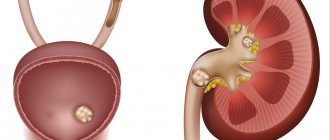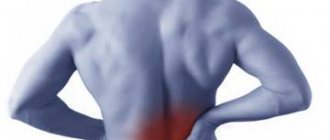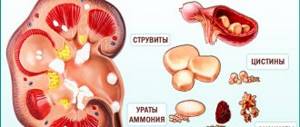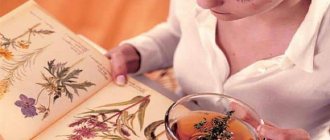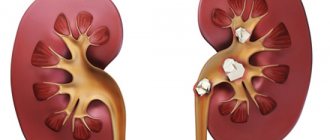Urolithiasis is perhaps the most common disease that affects every second city resident.
This is especially true for those who use raw water from the central water supply.
Stones can be located in any part of the urinary system: kidneys, bladder and urinary tract, ureter, and so on.
To prevent this from happening, you should not only take preventative measures to prevent the disease, but also treat it at the earliest stages.
Urolithiasis, treatment of which with folk remedies is sometimes as effective as the use of traditional medicine, is usually treated quickly and without consequences, especially in the early stages of the disease.
Therefore, if you notice the first signs of urolithiasis, such as difficulty or frequent urination, pain and cramping in the lower abdomen, pain in the kidneys, blood in the urine, and so on, then you should immediately visit a doctor and begin treatment.
Read about how this disease can be cured using natural remedies and what methods should be used for this, as well as about treating the disease with mineral waters.
Symptoms of the disease
There are no pain receptors in the kidney, so while the stone is in the calyx, the person does not feel it, and the outflow of urine is not impaired. Painful symptoms appear if the stone begins to move and moves into the pelvis. It’s even worse if the ureter is blocked. Renal colic occurs - acute cramping pain in the projection of the lower back, radiating to the groin, abdomen, and leg. Colic can be unbearable - it depends on the type, size of the stone, and how it moves. There are other symptoms of ICD.
- Cutting, burning during urination. They indicate the removal of sand and small stones.
- Changes in urine - cloudiness, appearance of purulent, bloody discharge.
- Frequent urination, nagging pain in the lower abdomen. This is how bladder stones manifest themselves.
- Pain in the kidney area with a sharp shake, after excessive consumption of salty foods, or drinking too much, for example, beer.
- Exacerbation of urolithiasis is often accompanied by fever, nausea, and vomiting.
In a state of exacerbation, the only correct way to treat urolithiasis is to consult a doctor
People of any age and gender can have kidney problems; the causes of neoplasms have not yet been fully studied. But some of the most common ones can be identified. These include:
- poor nutrition;
- sedentary lifestyle;
- dehydration;
- formation of an obstruction to urine excretion;
- hereditary disorders;
- diabetes and hypertension;
- irritable bowel syndrome;
- infections in the urinary tract.
Dull pain in the back and kidneys, which descends down the abdomen, characterizes the course of the disease. These signs indicate that the body has all the prerequisites for the formation of stones. Neoplasms spread to the ureters and bladder. When taking tests, there may be impurities of blood and protein in the urine. But sometimes the disease does not manifest itself at all, that is, it is asymptomatic. Therefore, an accurate diagnosis is needed to choose the right medicine.
Doppler ultrasound of the kidney vessels and kidney ultrasound will help determine the nature of the stones and their location. Only after this can you safely select medications for the treatment of urolithiasis, medicinal preparations, and medicinal decoctions.
Complex treatment therapy includes antibiotics (tablets or injections), drugs that inhibit the synthesis of uric acid, help improve urodynamics, adrenergic blockers, and phytotherapeutic agents.
Urolithiasis is all the more insidious and unpredictable because it does not manifest itself in any way until stones form. The first sign that there is some kind of formation is an attack of renal colic. The patient begins to urinate frequently and painfully, and is bothered by nausea and bloating. When the stone has passed the ureter and entered the bladder, the pain slowly disappears.
Everyone without exception who suffers from this disease experiences an attack of urolithiasis at least once in their life. At home, without proper assistance, this condition can lead to irreversible consequences.
Surgery can be avoided if you start taking the right medications on time.
Types of drugs
The choice of medication to dissolve kidney stones depends on the type of stone formation. Stones are oxalate, cystine, strutivite, urate and phosphate. The origin of kidney stones is different, which is why they are excreted differently. You should not take any medications on your own. To begin treatment correctly, you need to be examined by a urologist.
What is prescribed for urates?
Urate stones are characterized by a smooth and rounded shape. The size of the formation is from 1 mm to 2 cm. They have a yellow-brown color and are inherently loose. Such stones do not show themselves for a long time. To quickly eliminate symptoms, antispasmodics and anti-inflammatory drugs are used. Due to this, the muscles of the genitourinary system relax and the removal of stones is accelerated. If purine metabolism is disrupted, Allopurinol is prescribed.
How to get rid of oxalates?
Oxalate stones have a lumpy shape and reach a size of up to 4 cm. Sometimes they completely occupy the lumen of the kidney and in this case they can only be removed surgically. In addition, the pebbles have thorns and sharp edges, so this type of pathology is dangerous. If damaged, bleeding may occur, as evidenced by blood in the urine. Treatment with medications must be properly selected. It is important to use antispasmodics, painkillers and anti-inflammatory drugs. Effective remedy "No-shpa". You need to drink vitamins: tocopherol, pyridoxine, thiamine and good drugs: “Asparkam”, “Xidifon”.
Diuretic medications are taken with caution and only with agents that crush oxalates.
When were phosphates discovered?
Phosphate formations consist of a calcium salt of phosphoric acid. It can be detected during an X-ray examination. Phosphate stones have a fast growth rate: they become large in volume. To treat the deviation, you need to adhere to a strict diet and take drugs to dissolve kidney stones - uroseptics. If the phosphates are small in size, then plenty of fluids and diuretics are prescribed to expel them. For large sizes, surgery cannot be avoided.
Why does sand form in the urine and excretory system?
Humanity has been suffering from urolithiasis for a long time. However, modern technologies and many alternative medicine recipes aimed at dissolving salt deposits with timely diagnosis help prevent irreversible consequences. Many factors contribute to the formation of kidney stones, the most common of which include a sedentary lifestyle, insufficient amount of fluid drunk per day and poor environmental situation in the place of residence. Also, very often the cause of sand in the kidneys is pregnancy.
To avoid the appearance of stones, experts recommend drinking one and a half liters of clean water daily. This is the easiest way to prevent their formation. However, not everyone can drink such a volume of liquid, so doctors reduced its amount to 500 grams per day, the rest can be replenished with tea, milk, rosehip decoction, compote and natural juice. Moderate physical activity has also proven to be excellent, helping to improve blood circulation and metabolic processes in the body.
How to find out if there are kidney stones?
Determination of kidney stones is carried out using the following methods:
- Survey radiography to determine the number and location of stones;
- Ultrasound of the kidneys and urinary tract;
- Excretory urography to determine kidney function;
- Spiral computed tomography;
- A general urine test to determine the concentration of salts, the presence of erythrocytes and leukocytes.
Until complications occur in the form of renal colic or pyelonephritis, the patient may not suspect that he has a kidney stone. In some cases, dull pain in the lower back and a change in the type of urine may appear - during urination it turns from thick to liquid and light. A reddish or yellowish precipitate may be present.
Symptoms of renal colic are severe pain radiating to the groin area and lower abdomen, from which the patient cannot find a place to rest. Possible loss of consciousness, fever, increased temperature.
Herbal medicine and urolithiasis
As a result of improper metabolism, some people develop urolithiasis. It is characterized by the presence of dense formations - calculi, or popularly - stones, which form in the urinary tract. They are diagnosed both in the kidneys and in the ureter and bladder in men and women.
When the first symptoms of the disease appear, patients consult a doctor for treatment. Despite the expected list of complex pharmaceutical names, many patients receive recommendations to take various herbs to treat urolithiasis.
This alternative will not only allow you to get rid of the disease, but also do it in a natural way that is gentle on the body.
You cannot start treating urolithiasis on your own with herbs. This can lead to serious complications, causing the movement of large stones that get stuck in the kidneys or narrow urinary tract. The consequence of such self-medication is emergency surgery. Therefore, any impact on the disease should begin with a comprehensive diagnosis by a urologist.
As a rule, the doctor prescribes a series of laboratory and hardware tests of the kidneys and bladder, which clarify the picture of the disease. Using ultrasound, a specialist determines the location of stones, their size and shape, which is very important for the subsequent choice of treatment methods. The chemical composition of the formations is no less significant - urates, oxalates or phosphates.
For large stones, herbal medicine is not used, since the stones will not be crushed under the influence of herbs. In this case, the question arises about an alternative method of crushing stones. However, after the operation, doctors still recommend that patients use diuretic infusions of herbs to prevent further stone formation.
If an ultrasound examination shows that the stones in the kidneys or bladder are small, which means they are in the process of growing, then they are recommended to be removed without delaying treatment.
It is precisely because the removal of small stones in the best way occurs through herbal medicine that doctors consider diuretic herbal preparations as a priority.
Treatment of urolithiasis with folk remedies is subject to several rules that ultimately influence the choice of therapy. We list the main ones:
- The main rule of medicine - do no harm - has not been canceled. And when treating with herbs, it is especially relevant, since improper therapy can lead to serious consequences.
- If necessary, treatment with diuretics is combined with medications, especially if you need to relieve pain when stones pass through the urinary tract.
- When treating urolithiasis, patients must strictly adhere to the diet prescribed by the doctor based on the chemical composition of the stones.
- The use of herbs should be under the constant supervision of a specialist - in case of any sudden deterioration in health, he should provide the necessary assistance. This situation may arise if the stone blocked the ducts, or its fragments caused internal bleeding.
- During herbal treatment, periodic monitoring of the chemical composition of urine is necessary. Some of them are capable of alkalizing urine, which does not always have a positive effect on human health.
- When choosing herbs, it is necessary to take into account the composition of the stones and their size, anticipate possible complications, and only after confidence in the safety of herbal medicine, prescribe the appropriate fees.
- During treatment of the disease, it is necessary to maintain the correct drinking regime - at least 2 liters of water per day. It is recommended to take not plain water, but mineralized water. If there are oxalates in the kidneys, the water should be enriched with magnesium; with urates, alkaline water will help, and with phosphates, acidic water (soda).
Over a long period of treatment with folk remedies, doctors have studied the beneficial properties of herbs.
To treat urolithiasis of the kidneys, plants such as chamomile, peppermint, sage, St. John's wort, plantain leaves, knotweed, rose hips, yarrow, and heather are used.
This list could go on for a long time, but for now let’s look at the healing properties of the main herbal remedies that are used to expel stones from the body.
- Chamomile - this plant is known for its antiseptic effect, which is very important in the presence of stones in the kidneys and urinary ducts. As doctors note, in most laboratory urine tests in patients, the presence of an inflammatory reaction is observed. And this is not surprising, because the body protects itself from a foreign body. Chamomile not only relieves pain and spasms of the kidneys, but also eliminates inflammation.
- St. John's wort also has an antiseptic effect. In addition, this plant relaxes the smooth muscles of the internal organs and eliminates spasms when stones pass through narrow places in the urinary ducts.
- Plantain is famous for its antiseptic effect - even in childhood we applied it to broken knees to prevent suppuration. The use of plantain is also relevant in the treatment of urolithiasis. In addition, the plant has hypotensive properties. This is especially important for those people whose stones have sharp corners (coralline oxalates).
- Rosehip is useful not only for treating the heart, because vitamin C has a positive effect on the restoration of damaged tissue structure, which means that changes in urolithiasis can be reversible with the help of ascorbic acid. Rose hips are famous for their diuretic properties.
- Cranberry is indicated in limited quantities for urolithiasis, but the berry has a powerful anti-inflammatory effect and improves immunity. This will ensure that stones will not form again.
- Birch buds help remove excess fluid from the body. When treating with folk remedies, doctors recommend drinking at least 2 liters of water per day so that stones and sand are well removed from the body. However, if there is swelling, they need to be eliminated, which is where diuretic birch buds will help us.
- Yarrow is an excellent antiseptic that helps eliminate pain when stones move. Regular addition to tea can improve the patient's immunity.
To treat urolithiasis of the kidneys, doctors recommend adapted herbal preparations that act on the calculus, breaking it down. The second property of such preparations is diuretic. It is thanks to him that small stones and their fragments follow the urinary tract. Here is an example of several recipes that will help get rid of stones in the urinary tract in both men and women.
Collection according to Jordanov
To prepare a diuretic, you need to collect nettle leaves, rose hips, peppermint, horsetail and juniper in equal proportions.
All ingredients are mixed well, after which one tablespoon of the mixture is poured with a glass of boiling water and infused under the lid for about an hour. By this time the liquid will have cooled and you can drink it.
Doctors recommend taking two tablespoons of the collection three times a day. Treatment is carried out for at least a month.
Yarrow and knotweed have an excellent effect on oxalate stones.
1.5 tablespoons of each herb are mixed in a glass container (you can take a liter jar), after which the composition is filled with 2.5 glasses of cold water.
The collection should sit overnight, then it is boiled over low heat for about 15 minutes, filtered and taken a glass a day in small sips. The course of herbal medicine is one and a half months.
Knotweed and heather
20 g of knotweed, common heather and peppermint are poured into 600 ml of water, left overnight and boiled over low heat in the morning. Drink a glass of the strained liquid every day, after which a week later you need to take a urine test. Based on the results of the study, the doctor determines the effectiveness of treatment and the expected duration of herbal medicine - from 1 to 1.5 months.
Forbs
A urological collection of various herbs will help not only relieve inflammation, but also increase the flow of urine during the passage of stones. To prepare the product, you will need to take one part each of chamomile, peppermint, sage and St. John's wort, as well as two parts of plantain leaves.
The resulting mixture is mixed well, after which 1 tablespoon of dry ingredients is poured with a glass of boiling water and infused over a pan of boiling water. It is important that the water does not touch the container with the product, otherwise the water bath effect will not work.
Take the resulting strained liquid a quarter glass five times a day.
Herbal treatment of urolithiasis requires the patient to take a responsible attitude towards their health. It is very important that all proportions are observed when preparing urological preparations, and the systematic use of these funds is no less important.
Treatment of urolithiasis with herbs - basic rules and recommendations Link to main publication
In order for herbal medicine to give results and not cause harm, you need to know in what cases it is effective.
- In combination with medications, renal herbal teas complement traditional therapy aimed at crushing, dissolving, and washing out pieces of stones.
- If sand is found, with the help of herbal mixtures it can be removed, stone formation can be stopped, and lost kidney function can be restored.
- Herbal medicine is effective after stone removal. Since surgery does not eliminate the cause of nephrolithiasis, stones form again. In this case, medicinal preparations are formulated so that the components normalize metabolic processes in the body and prevent stagnation.
- Herbs should be selected taking into account the type of stones. For example, lingonberry leaves dissolve urate stones, and agrimony and madder dissolve phosphates. There are also universal herbs that are taken regardless of the composition of the calculus - goldenrod, knotweed, horsetail, corn silk.
Folk remedies are recommended to be taken during remission, after preliminary consultation with a doctor. It is difficult to say how the stone will behave as a result of the influence of the herbal infusion - it will begin to dissolve, shift, and the broken off particles will begin to come out spontaneously. You need to be prepared for possible complications.
Ready-made pharmacological products based on medicinal herbs include tablets: Cyston, Canephron, Proolit, Fitolysin. They relieve spasms and have a diuretic effect.
List of medications
Litholytic therapy is a technique using crushing drugs, which is aimed at dissolving formations in the excretory system. It consists of a variety of medications aimed at treating kidney stones. Medicines come in the form of tablets, drops, as well as powder capsules, injections and syrups. A complete list of funds is provided below.
"Phytolysin"
A combined product of plant origin that has an analgesic, diuretic, and antimicrobial effect. The natural composition crushes and removes stones from the kidney, preventing new formation. It has a mild effect without causing complications. Available in the form of a paste, which is consumed orally.
Vegetable "Prolit"
Medicine for kidney stones, good for small stones. It is drunk to soften, after which the active components that dissolve kidney stones come out. "Prolit" also acts as an antispasmodic and acts as a urinary and biliary agent. Fights inflammatory processes. It consists of natural ingredients, so the negative impact is minimal.
"Urolesan"
The medicine is of plant origin. Thanks to its composition, Urolesan is the best remedy against inflammation. Destruction of formations occurs in the genitourinary system, after which they are excreted. It takes effect fairly quickly, but the effect is short-lived. As soon as the stone reaches a size greater than 3 mm, the drug is not prescribed.
"Canephron N"
The herbal pharmaceutical preparation provokes the removal of kidney stones. It is characterized by the best medicinal properties, therefore it acts as an anti-inflammatory, diuretic, antispasmodic, analgesic and antioxidant agent. It can be used in combination with other medications, but it is better to consult your doctor about compatibility.
"Fitolit" against urolithiasis
Medicines for crushing kidney stones are widely available on the pharmaceutical market. "Fitolit" based on herbs is an effective remedy. St. John's wort in its composition has a regenerating effect, and knotweed has a splitting effect on stone formations. To rid patients of stones, horsetail as part of the drug also helps, which eliminates the symptoms of pain.
"Kedjibeling"
Dietary food supplement. It must be taken to saturate the body with the missing nutrients. The product is available in capsules. The course of treatment is 2-3 weeks. Take 2 pieces three times a day during meals. The main task of the medicine is to restore metabolic processes. Simultaneous use with other drugs is possible, but only with the permission of the doctor.
"Rovatinex"
The herbal medicine has a beneficial effect on the body, which is facilitated by its plant origin. The drug causes frequent urination. The constituent components crush stones and promote removal. During use, existing stones do not grow in size. Reduces pain effects when unnecessary substances leave the body. Taking with antibiotics is contraindicated.
Activity of "Cyston"
Promotes the removal of salts and at the same time prevents the formation of urolithiasis. Removing stones is a difficult procedure, but thanks to the gentle action of the medication, they gradually dissolve and are removed, although this is a long process. The drug eliminates pain symptoms and kills germs. No side effects were observed, except for personal intolerance to the components.
Madder
A medicine with diuretic properties is prepared from the leaves and rhizomes of the plant, which helps remove stones. The effect is gradual, with a loosening effect. In the process of consuming the herb, the water-lipid balance is restored and painful feelings are eliminated. For treatment, both decoction and infusion are used. Madder is the main component of the medicine "Cystenal".
"Cystotransit"
The product eliminates pain symptoms and sand, fights intoxication of the body. Improves the performance of the genitourinary system. During pregnancy, breastfeeding and in case of personal intolerance to the components, the drug is not considered for treatment. A medicinal drink is prepared from the suspension for oral administration. The course of treatment is 3 weeks.
Supplement "Uro-lax"
This type of medicine is aimed at maintaining the water-salt balance of the body. Thus, it protects against harmful influences and prevents the development of urolithiasis. Strengthens the immune system, which helps in the fight against existing diseases and prevents the development of new ones. Copes with swelling. Duration of use: 1 month, 1 capsule 2 times a day.
Leave a comment 5,204
In case of urolithiasis, it becomes necessary to use diuretics. Diuretic herbs for urolithiasis are an excellent and safe way to improve the excretion of sodium from the body. The use of herbal medicine should be started only after examination and consultation with a doctor, since self-medication does not lead to the expected results.
Traditional therapy
When diagnosed with urolithiasis, treatment with folk remedies is recommended only after a complete examination and an accurate diagnosis. Since stones come in different types, sizes, treatment can vary significantly.
It is also important to know that traditional medicine gives good results only with an uncomplicated course of urolithiasis. If the diameter of the stones exceeds 1 cm, then traditional methods are used only as an addition to the main treatment.
Treatment of urolithiasis with folk remedies is possible only taking into account the type of stones:
- Oxalate stones – this type of deposits is the most common in both men and women.
The stones have sharp edges, so a person may experience severe pain. To remove this type of stone, it is recommended to drink as much clean water as possible, and it is also necessary to take medications to alkalize urine. The most common folk method for this type of stone is the watermelon diet, which must be followed for one to two weeks.
- Phosphate stones - this type of stones responds to therapy much better than oxalates.
Since they are much softer, they do not have sharp corners. To eliminate phosphate formations, it is recommended to drink urological preparations from rose hips, parsley, and barberry. Include mineral waters in the menu, for example, Arzni. - Urate stones - to alkalize urine, it is recommended to drink vegetable juices (cucumber, pumpkin). Patients are advised to drink tinctures of strawberries, lingonberry leaves, and blueberries.
For urate formations, porridge made from oat grains is very useful, but you need to eat it without adding sugar, salt and other seasonings. In order for the grains to soften well, they should be brewed overnight.
To avoid complications, all treatment measures must be coordinated with the attending physician.
Localization of stones
The term urolithiasis refers to the presence of stones in the kidneys, ureter, and bladder. It is worth noting that the male population over 40 years of age is susceptible to the formation of bladder stones. Stones in the bladder in men are formed against the background of diseases of the prostate gland and urethra.
Urolithiasis and methods of treatment with folk remedies depending on the location of the stone:
- Stones in the ureter - for this pathology, teas made from mint, lemon balm, and chamomile are indicated. An infusion of carrot seeds also has an effective effect. It is important to know that if a stone is stuck in the ureter, this is a rather dangerous condition and medical attention is required. A diuretic herbal decoction can be used as an auxiliary measure, and people are also advised to take a warm bath. In order to dissolve a stone in the ureter, you must know its type. Since even ordinary drinking water removes small urates, and oxalates will be removed with the help of alkaline drinks.
- Bladder - stones in the bladder can be treated successfully with folk remedies. The greatest effect is achieved by drinking turnip juice infrequently. You can also make a mixture of honey and celery seeds. It is enough to eat 2-3 spoons a day.
- Kidneys – for urolithiasis in women and men, it is recommended to take an infusion of horsetail for several months. Rosehip root also has a potent effect. A decoction of rosehip root is one of the fastest non-traditional ways to dissolve stones. Typically, decoction treatment lasts from a week to a month. Since the product is very powerful, it is necessary to correctly calculate the dosage. Treatment is carried out only after consulting a doctor.
- Urethra – men most often suffer from stones in the urethra, this is due to the structure of their urinary canal. But it is also possible for stones to appear in the urethra in women. What to do with this pathology? The stone is removed by a doctor. Traditional medicine is used as a supportive measure. Anti-inflammatory, restorative herbal infusions are indicated.
With ICD, it is necessary to exclude salt, nuts, fried and spicy foods from the menu. Dairy products are allowed in small quantities.
Phytotherapy
Herbs for urolithiasis of the kidneys play a vital role in folk medicine. They not only promote the dissolution and removal of stones, but also have an antiseptic and antimicrobial effect. And also many herbs have an immunomodulatory effect. Therefore, herbal medicine for urolithiasis is one of the most effective methods.
Herbs are used both as independent means of treatment and in collections. Teas, infusions, decoctions are prepared from them, and also added to the bath.
The following herbs are most popular for urolithiasis:
- St. John's wort;
- chamomile;
- nettle;
- cornflower;
- parsley;
- lingonberry leaves;
- tansy.
There are many recipes, let’s look at the most effective ones:
- Recipe No. 1 - lingonberry, wild strawberry and bird's-eye leaves are poured with hot water, then infused in a water bath for half an hour. Afterwards, the herbal infusion is removed from the heat and cooled for 30 minutes. At the same time as taking the infusion, you need to take No-shpa.
Effect: the infusion dissolves stones, has an antimicrobial and anti-inflammatory effect.
- Recipe No. 2 - horsetail, chamomile and calendula flowers, kidney tea, pour boiling water and also leave in a water bath for 30 minutes.
Effect: this decoction has a diuretic effect and also dissolves small stones. The drink is also indicated for renal colic, as it has a pronounced analgesic effect.
- Recipe No. 3 - dry cornflower is brewed with hot water and covered with a lid for 15 minutes. You can also add lingonberry or currant leaves to cornflower.
Effect: relieves inflammation, improves overall well-being.
To achieve maximum effect, it is recommended to alternate herbal infusions. The standard course of treatment is 21 days.
Another effective measure for treating urolithiasis is drinking juices. Fresh natural juices allow you to crush stone formations in a few days. But you should know that juice therapy has contraindications.
What juices should you drink if you have a pathology?
- Radish juice – take one tablespoon of May radish juice 3-4 times a day. Effectively dissolves and removes stones from the body.
- Lemon juice – mix with water and drink several times a day.
- Juice mixture - a cocktail of cucumber, carrots, beets is recommended to be drunk every morning on an empty stomach during the summer.
- Cranberry juice is indicated for the treatment and prevention of urolithiasis. Cranberries are considered one of the most useful berries for eliminating any diseases of the genitourinary system.
Natural juices are not recommended for people with gastritis.
General recipes for the treatment of urolithiasis using traditional methods:
- Olive oil – people suffering from urolithiasis need to take one or two tablespoons of olive oil daily.
- Birch sap - in spring it is very useful to drink fresh birch sap with the addition of honey.
- Onion tincture - pour chopped onions with vodka, leave in a warm place for two weeks. You need to take onion tincture twice a day.
- Horseradish with milk – a dessert spoon of horseradish is added to hot milk. You need to drink the drink in small sips. The course of treatment is a week.
- Apples – pour boiling water over dried apple peels. Drink the drink in the morning. In addition to dissolving deposits, it has a fortified effect.
These are the main folk remedies that are used for urolithiasis.
The detailed dosage regimen for each prescription must be agreed with your doctor.
Bladder diseases are divided into infectious and urolithiasis. Bladder problems begin in people regardless of age and gender.
Most bladder-related diseases begin in the kidneys.
Urolithiasis is a disease in which mineral compounds accumulate in the ureters and renal ducts, these formations are a by-product of the process of filtering fluid in the body.
When it appears in the bladder, painful symptoms immediately appear. This disease is accompanied by vivid and very strong symptoms, including:
- When a stone moves from the kidney down the ureter, pain is located somewhere in the lower abdomen, in the genitals and thighs. During the acute stage of the disease, accompanied by sharp, hellish pain, the stone can come out along with urine.
- Periodic pain in the bladder or kidney, which is accompanied by moderate pain and discomfort, with sudden body movement or physical activity. This occurs due to the movements of the stone itself along the ureter, kidneys and bladder.
- A sharp/dull pain when urinating, which is associated with stones accumulated in the bladder. With a large number of stones or the presence of a large stone, a blockage of the urinary duct may occur, in which urination is completely blocked, or the process is very difficult. If the urinary duct is severely blocked, prompt surgery is necessary to prevent death. From time to time, when a person moves, the urinary duct opens and uncontrolled urination occurs.
- Bloody discharge in the urine is more likely to indicate stones in the bladder than to an infection, which, however, is also possible, since the symptoms of the disease are similar.
- Cloudy urine and a strong odor.
- Chills and increase in body temperature to 38.
- Swelling in the legs.
- The appearance of hypertension.
The appearance of the smallest stone or sand in the bladder will make you howl with pain and cutting in the area of the urinary canal.
The human physical body is perfect, it is capable of recycling any garbage, but alas, even it cannot cope with everything. And where does it go? That's right, it is deposited on the walls of blood vessels, in tissues, forming plaques and stones. This process is facilitated by impaired metabolism in the body, usually water-salt balance and dysfunction of the chemical composition of the blood.
Factors contributing to the growth of the disease:
- Genetic program or heredity;
- Old diseases of the genitourinary system or gastrointestinal tract.
- Thyroid dysfunction;
- Presence of bone and joint diseases (osteoporosis, coxarthrosis, osteochondrosis, arthritis);
- Consequence of an infectious disease, in the form of a side effect;
- Abuse of foods that have an acidic environment (smoked, salted, fried, sour);
- Drinking “bad” water, with a high content of salts;
Oxalate stones - when oxalic acid is elevated in the body, such stones form. In appearance they resemble dark gray crystalline formations, which, due to sharp angles, cannot come out on their own, and during movement they bring severe suffering to a person, as they scratch against the walls of the bladder and urinary duct.
Diuretic products
Have you been trying to cure your KIDNEYS for many years?
Head of the Institute of Nephrology: “You will be amazed at how easy it is to heal your kidneys just by taking it every day.
Our readers successfully use Renon Duo to treat kidneys. Seeing how popular this product is, we decided to bring it to your attention. Read more here...
Diuretic products must be present in your daily diet. They will help cope with swelling, for example, of the legs without the use of medications. Although in advanced cases it will not be possible to do without medication. By eating food with diuretic properties, you can get rid of excess fluid without losing important microelements. It is advisable to first ask your doctor which products you should pay attention to.
- Benefits of Diuretic Products
- Eating vegetables, fruits and berries
- What else should be in the diet?
Benefits of Diuretic Products
Why do doctors recommend organizing your nutritious diet so that it contains enough products (Product - food (in the phrase “food”)) with a diuretic (drugs of various chemical structures that inhibit the reabsorption of water in the kidney tubules (a commune in France, located in the region Champagne - Ardennes) and salts and increasing their excretion in the urine; increasing the rate of urine formation and, thus,) action (an ambiguous word that can mean: Act of activity)?
Most people are constantly worried about one unpleasant problem: swelling of the lower or upper extremities, face, and abdominal area. And the first thing a person does is try to take diuretic drugs, forgetting how harmful they can be. And although with the help of such drugs it is possible to quickly achieve the desired result, the number of elements important for maintaining a healthy state in the body is reduced.
Natural diuretics are diuretics (drugs of various chemical structures that inhibit the reabsorption of water and salts in the kidney tubules and increase their excretion in the urine; increase the rate of urine formation and, thus) (drugs of various chemical structures that inhibit the reabsorption of water and salts in the kidney tubules and increasing their excretion in urine; increasing the rate of urine formation and, thus, ) foods and drinks.
Their advantage is:
- The presence of minimal calories, which is why such food can be consumed constantly.
- No negative effect on organs and systems.
- The presence of a significant amount of various substances, without which the body cannot function normally.
Diuretics of natural origin have a much milder effect than various diuretic drugs. Excess moisture is removed gradually.
You should lean on foods that have a diuretic effect if you experience the slightest symptoms that indicate fluid accumulation. If the situation worsens, herbal remedies will no longer help.
Diuretic foods are indicated for:
- renal and cardiac disorders;
- diabetes mellitus;
- obesity;
- cellulite.
Often women suffer from swelling before the start of the menstrual cycle, as well as during pregnancy. Products that have a diuretic (drugs of various chemical structures that inhibit the reabsorption of water and salts in the kidney tubules and increase their excretion in the urine; increase the rate of urine formation and, thus,) effect, will help significantly alleviate the condition.
Swelling can also occur in hot weather and as a result of heavy exertion. Don't rush to take medications right away. If the situation can easily be changed for the better, you should reconsider your diet. And for this it is necessary to analyze in detail which products have a diuretic effect.
Eating vegetables, fruits and berries
Diuretic vegetables are products that help eliminate accumulated moisture, while sodium salts are removed along with it.
And since the potassium content remains normal, the balance of the elements is maintained. What products (Product - food (in the phrase "food")) (Product - food (in the phrase "food")) can boast diuretic properties?
Experts advise eating:
- Tomatoes. They are rich in potassium, so they are very useful for swelling.
- Cucumbers. These vegetables contain almost 90% water. They will help if there are stones in the kidneys (Kidney (anatomy) is an organ of the excretory (urinary) system of animals and humans), and for people suffering from diabetes.
- Beetroot. The effect is determined by the content of magnesium and potassium salts. True, beets are a contraindication for kidney stones.
- Pumpkin. This is not only a diuretic food, but also a food that has an anti-inflammatory effect. Pumpkin is an excellent solution for excess moisture for pregnant women.
- Apples. Beneficial due to potassium content.
- Plums. First of all, they have laxative properties. But it has also been proven that plums can remove moisture.
- Chereshnyakh. It should be noted that they are quite strong diuretics.
- Strawberries. It will help lower blood pressure and remove excess fluid.
- Ive. It will be useful for patients diagnosed with cardiovascular pathologies.
Which berries are diuretic? You should know that you can eat both fresh and frozen berries. In any form they retain their qualities.
The list should include:
- Cranberries. It has a mild effect if there is an allergy or lack of vitamins.
- Lingonberry. For swelling, you can help the body by eating berries, as well as making medicinal teas and infusions from the leaves.
- Currants. Vitamin C and potassium promote increased urine formation.
- Rose hip. Both fruits and leaves have a diuretic effect. Rose hips can be used as a choleretic agent.
- Kalina. Copes with excess moisture and can have an antiviral effect.
- Sea buckthorn. If you drink berry decoction every day, the result will soon become very noticeable.
What else should be in the diet?
Everyone knows about the beneficial properties of cereals.
However, not everyone knows that these products (Product - food (in the phrase "food")) (Product - food (in the phrase "food")) are diuretics. The main thing is to be able to cook them correctly. This means that the porridge must be cooked without using sauces. So its healing effect will be maximum.
There is a list of cereals that you should remember in order to use them to your advantage.
Swelling is eliminated by using:
- buckwheat, which is rich in rutin and other microelements;
- oatmeal, which lowers cholesterol and gets rid of excess moisture;
- barley;
- barley porridge.
When you are often bothered by swelling in the morning, you need to drink a glass of kefir before going to bed. Fermented milk products do an excellent job of removing fluid and have the most beneficial effect on the digestive process.
In case of swelling, preference should be given to:
- fruit drinks;
- juices;
- green teas;
- compotes;
- herbal decoctions;
- mineral water without gas.
Diuretic properties are also characteristic of drinks containing caffeine - strongly brewed tea and coffee.
Numerous seasonings have proven themselves to be excellent diuretics.
- Ginger. Thanks to it, unnecessary water, toxic substances and waste are removed.
- Cumin. A very powerful diuretic, which is prescribed for kidney problems (Kidney (anatomy) is an organ of the excretory (urinary) system of animals and humans).
- Spinach. It is useful to use after treating diseases of the genitourinary system.
- Sweet and hot peppers. Removes water and dilates blood vessels.
- Turmeric. A drug that stimulates increased urine production.
The list can be supplemented with cinnamon, parsley, garlic, mustard.
Excess fluid is dealt with using:
- milk thistle;
- chicory;
- mint;
- chamomile;
- lemon balm and other plants.
Diuretic properties are present in a huge number of products, but doctors insist: before you start actively consuming them, you must consult a doctor. This is especially true for infusions that can cause serious reactions.
Pregnant women should also consult a doctor so that a nutritious diet does not turn out to be detrimental to the baby.
Herbs for the treatment and prevention of urolithiasis
Let's consider medicinal herbs that have proven themselves in the treatment of urolithiasis.
- Lingonberry leaves
Lingonberry leaves are a recognized natural diuretic. An infusion of them is recommended as a diuretic for various inflammations of the genitourinary system, pyelonephritis, and urolithiasis. The plant contains up to 9% arbutin, a phenolic compound that cleanses the urinary tract of pathogenic bacteria and residual salts, inhibiting pathogens of urological infections.
Lingonberry has a multivitamin composition, has anti-inflammatory, antimicrobial, choleretic properties.
- Corn silk
In herbal medicine, corn columns and stigmas collected in the milky-waxy ripeness phase are used. This is a good diuretic, anti-inflammatory agent, effective against kidney stones, inflammation of the bladder, and cardiac edema. When treating urate stones, corn silk is used in its pure form. To crush phosphate and carbonate stones, they are used as part of herbal mixtures with birch leaves, knotweed grass, and burdock roots.
- goldenrod
Goldenrod or golden rod is a medicinal plant recognized by official medicine with a pronounced diuretic, anti-inflammatory, and antimicrobial effect. The plant extract is included in pharmacological preparations for the treatment of urolithiasis - “Marelina”, “Fitolysina”. Goldenrod infusion promotes the crushing and elimination of urates and oxalates, and relieves inflammation in the kidneys. Contraindicated for phosphate stones, as it increases the alkaline reaction of the environment.
- knotweed
The herb knotweed (knotweed) is known for its diuretic properties, it washes away oxalic acid salts, drives away sand, and facilitates the passage of small stones. The plant contains silicic acid, which inhibits the process of crystallization of salts, thereby preventing stone formation. Knotweed is recommended to prevent urolithiasis.
In addition to being a diuretic, knotweed is known for its antiseptic, analgesic, and wound-healing effects.
- Horsetail
Another mild natural diuretic that is used to treat genitourinary pathologies. Horsetail preparations, thanks to silicic acid, have colloidal properties - they do not crystallize and prevent the formation of stones. Horsetail infusions are not recommended for use in cases of nephritis of various etiologies, at the time of exacerbation of inflammatory processes.
- Calamus (rhizomes)
The spongy rhizome of calamus is used as a diuretic. The plant has analgesic properties, relieves inflammation, spasms, and inhibits pathogens. For the treatment of urolithiasis, calamus is effective when combined with lingonberry leaves, horsetail, agrimony grass, and wheatgrass. In addition, calamus is often used as part of gastric herbal mixtures.
It is interesting that calamus began its journey across Europe as a cultivated plant, but over time it became wild
- St. John's wort
One of the many healing properties of St. John's wort is the normalization of salt metabolism. In kidney preparations it is used as an adjuvant with a pronounced anti-inflammatory, antiseptic, and antispasmodic effect.
It has been proven that herbal treatment is more effective if used together. Proven herbal remedies, such as Nephron kidney herbal tea, consist of 7–10 components and have a comprehensive effect on the problem. They have a minimum of contraindications and are distinguished by an amazing synergy of ingredients, strengthening and tuning the body for self-healing.
Products from the article
"Nephron herbal tea for kidneys"
“Herbal tea “Fital 6 Chaga-mix for the stomach”
Contraindications for the use of diuretics
A diuretic for urolithiasis is absolutely contraindicated if the size of the stone exceeds 5 millimeters. If a large stone begins to pass out of the body, it increases the risk of blockage of the ureter, which will lead to stagnation of urine. Diuretics should not be used by children under 12 years of age. If one of the components of the diuretic causes an allergic reaction, you should immediately stop taking the drug. Herbal medicine in the presence of urolithiasis, which is accompanied by heart or stone failure, is also contraindicated. The use of diuretics for urolithiasis should only be carried out under the supervision of a physician.
Mineral waters that dissolve kidney stones
Drinking mineral water helps dissolve kidney stones. However, you need to choose it correctly.
- Alkaline mineral water is suitable for treating patients with urate and oxalate stones. These are drinks such as: Borjomi, Dilijan, Essentuki 17, Polyana Kvasova.
- Acidic mineral water effectively removes phosphate stones from the body. These are drinks such as: Narzan, Mirgorodskaya, Smirnovskaya.
A mineral water bottle may have a number on it. If the number is 17, then the water is alkaline. If the name is followed by the number 4, then such water is slightly alkaline. It is worth considering that mineral waters with the same name may have different alkalinity and acidity. It is to determine this indicator that water is numbered.
A sufficient volume of ordinary water consumed by the patient during the day reduces the concentration of salts in the urine and lowers its acidity. This leads to the dissolution of small diameter urate stones. If the stone has a mixed composition, this method may not help get rid of the stones.
To dissolve oxalates and urate stones, alkaline drinks and citrate preparations are used. They are taken additionally not only to dissolve stones, but also to prevent their formation after stone crushing surgery.
Is it possible to remove kidney stones?
There are 2 groups of methods for treating urolithiasis: conservative and surgical. This pathology is a surgical disease, so surgical techniques are more often used.
Factors influencing the choice of method for removing kidney stones:
- Age and health status of the patient;
- Size and location of stones;
- Features of the anatomy of the kidney and its functioning;
- Current stage of renal failure.
If there are urate stones formed from uric acid salts, they can be dissolved with citrate mixtures.
In all other cases, lithotripsy is indicated:
- Non-contact destruction of stones by electromagnetic, piezoelectric, electro-hydraulic shock waves - used in the presence of stones up to 2 cm in diameter; removal of fragments is required;
- Percutaneous contact nephrolithotripsy - kidney puncture is performed using an endoscope and subsequent removal of the stone;
- Urethrolithotripsy - an endoscope is inserted through the urethra.
In uncomplicated cases, a folk recipe for removing kidney stones with honey water can help. It is prepared from 2 tsp. honey dissolved in 200 ml of water. The mixture is drunk in the morning on an empty stomach. The course is continued from 1 to 6 months.
